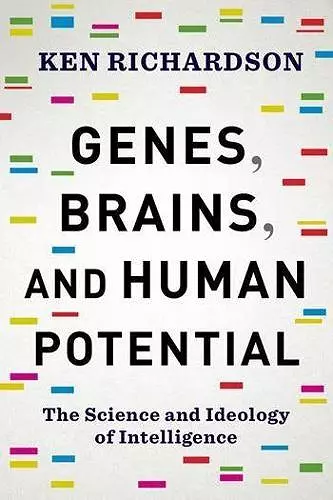Genes, Brains, and Human Potential
The Science and Ideology of Intelligence
Format:Hardback
Publisher:Columbia University Press
Published:11th Apr '17
Currently unavailable, and unfortunately no date known when it will be back

For countless generations people have been told that their potential as humans is limited and fundamentally unequal. The social order, they have been assured, is arranged by powers beyond their control. More recently the appeal has been to biology, specifically the genes, brain sciences, the concept of intelligence, and powerful new technologies. Reinforced through the authority of science and a growing belief in bio-determinism, the ordering of the many for the benefit of a few has become more entrenched. Yet scientists are now waking up to the influence of ideology on research and its interpretation. In Genes, Brains, and Human Potential, Ken Richardson illustrates how the ideology of human intelligence has infiltrated genetics, brain sciences, and psychology, flourishing in the vagueness of basic concepts, a shallow nature-versus-nurture debate, and the overhyped claims of reductionists. He shows how ideology, more than pure science, has come to dominate our institutions, especially education, encouraging fatalism about the development of human intelligence among individuals and societies. Genes, Brains, and Human Potential goes much further: building on work being done in molecular biology, epigenetics, dynamical systems, evolution theory, and complexity theory, it maps a fresh understanding of intelligence and the development of human potential. Concluding with an upbeat message for human possibilities, this synthesis of diverse perspectives will engender new conversations among students, researchers, and other interested readers.
In his latest book, Genes, Brains, and Human Potential, Richardson has again creatively illuminated the bases and limitations of genetic reductionist accounts of human intelligence, showing how cutting-edge research provides a valid alternative to such counterfactual and egregiously flawed models. Informative and inspiring, he convincingly counters these failed accounts of intelligence, forwarding a new relational theory of human development. -- Richard M. Lerner, Bergstrom Chair in Applied Developmental Science and Director, Institute for Applied Research in Youth Development Tufts University Ken Richardson's previous books played a key role in countering genetic determinist theories of human intelligence. In this important new book, Richardson shows that genetic theories of intelligence are based on "bad science," and puts forward a dynamic model of human potential. In the process, he highlights recent discoveries about the nature of the gene and biological systems that support a new model of intelligence. His work has important implications for education, and for understanding human intelligence. -- Jay Joseph, Psy.D., clinical psychologist and author of The Trouble with Twin Studies. Genes, Brains, and Human Potential presents the synthesis of an extended biological systems view of intelligence that Ken Richardson has developed over decades. This bold book is a must-read for those interested in the science of intelligence and human potential. It provides a skillful and scholarly critique of traditional views of intelligence that continue to rely on outdated genetic or brain reductionism. In its place Richardson presents a comprehensive and rich analysis of how intelligent systems develop through dynamical processes occurring across multiple biological and psychological levels, from cells to societies. This book represents a significant advance in our understanding of human development and potential, a clear and comprehensive road map for anyone interested in making sense of the complexities of intelligence and its development across the life span. -- Robert Lickliter, Florida International University
ISBN: 9780231178426
Dimensions: unknown
Weight: unknown
408 pages